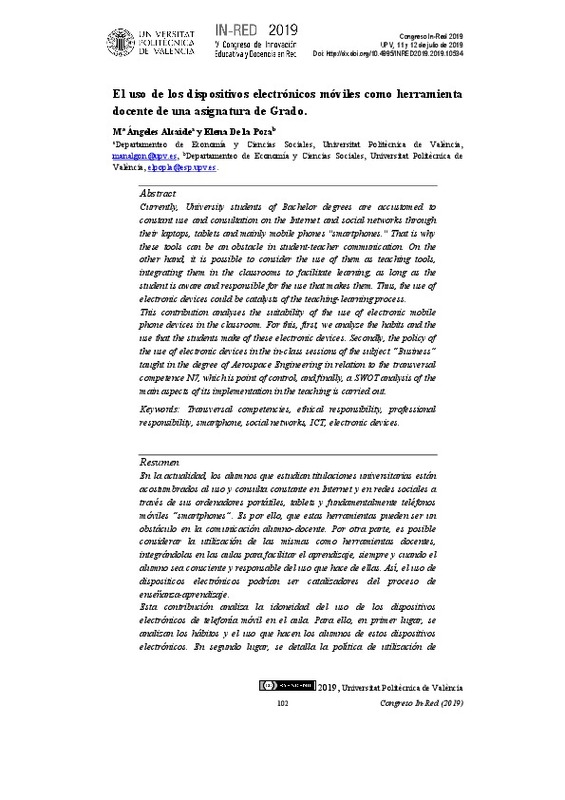JavaScript is disabled for your browser. Some features of this site may not work without it.
Buscar en RiuNet
Listar
Mi cuenta
Estadísticas
Ayuda RiuNet
Admin. UPV
El uso de los dispositivos electrónicos móviles como herramienta docente de una asignatura de Grado
Mostrar el registro sencillo del ítem
Ficheros en el ítem
| dc.contributor.author | Alcaide González, María Ángeles
|
es_ES |
| dc.contributor.author | De la Poza, Elena
|
es_ES |
| dc.date.accessioned | 2019-10-18T12:44:16Z | |
| dc.date.available | 2019-10-18T12:44:16Z | |
| dc.date.issued | 2019-09-30 | |
| dc.identifier.isbn | 9788490485224 | |
| dc.identifier.issn | 2603-5863 | |
| dc.identifier.uri | http://hdl.handle.net/10251/128958 | |
| dc.description.abstract | [EN] Currently, University students of Bachelor degrees are accustomed to constant use and consultation on the Internet and social networks through their laptops, tablets and mainly mobile phones "smartphones." That is why these tools can be an obstacle in student-teacher communication. On the other hand, it is possible to consider the use of them as teaching tools, integrating them in the classrooms to facilitate learning, as long as the student is aware and responsible for the use that makes them. Thus, the use of electronic devices could be catalysts of the teaching-learning process. This contribution analyses the suitability of the use of electronic mobile phone devices in the classroom. For this, first, we analyze the habits and the use that the students make of these electronic devices. Secondly, the policy of the use of electronic devices in the in-class sessions of the subject “Business” taught in the degree of Aerospace Engineering in relation to the transversal competence N7, which is point of control, and finally, a SWOT analysis of the main aspects of its implementation in the teaching is carried out | es_ES |
| dc.description.abstract | [ES] En la actualidad, los alumnos que estudian titulaciones universitarias están acostumbrados al uso y consulta constante en Internet y en redes sociales a través de sus ordenadores portátiles, tablets y fundamentalmente teléfonos móviles “smartphones”. Es por ello, que estas herramientas pueden ser un obstáculo en la comunicación alumno-docente. Por otra parte, es posible considerar la utilización de las mismas como herramientas docentes, integrándolas en las aulas para facilitar el aprendizaje, siempre y cuando el alumno sea consciente y responsable del uso que hace de ellas. Así, el uso de dispositicos electrónicos podrían ser catalizadores del proceso de enseñanza-aprendizaje. Esta contribución analiza la idoneidad del uso de los dispositivos electrónicos de telefonía móvil en el aula. Para ello, en primer lugar, se analizan los hábitos y el uso que hacen los alumnos de estos dispositivos electrónicos. En segundo lugar, se detalla la política de utilización de dispositivos electrónicos en las sesiones de clase de la asignatura de Empresa impartida en el Grado de Ingeniería Aeroespacial en relación a la competencia transversal N7, que es punto de control, y por último, se realiza un análisis DAFO de los principales aspectos de su implementación en la docencia. | es_ES |
| dc.format.extent | 12 | es_ES |
| dc.language | Español | es_ES |
| dc.publisher | Editorial Universitat Politècnica de València | es_ES |
| dc.relation.ispartof | IN-RED 2019. V Congreso de Innovación Educativa y Docencia en Red | es_ES |
| dc.rights | Reconocimiento - No comercial - Sin obra derivada (by-nc-nd) | es_ES |
| dc.subject | Educación superior | es_ES |
| dc.subject | Enseñanza superior | es_ES |
| dc.subject | Tecnologías y educación | es_ES |
| dc.subject | Innovación educativa | es_ES |
| dc.subject | Competencias transversales | es_ES |
| dc.subject | Responsabilidad ética | es_ES |
| dc.subject | Responsabilidad profesional | es_ES |
| dc.subject | Smartphone | es_ES |
| dc.subject | Redes sociales | es_ES |
| dc.subject | TIC | es_ES |
| dc.subject | Dispositivos electrónicos | es_ES |
| dc.subject | Transversal competencies | es_ES |
| dc.subject | Ethical responsibility | es_ES |
| dc.subject | Professional responsibility | es_ES |
| dc.subject | Social networks | es_ES |
| dc.subject | ICT | es_ES |
| dc.subject | Electronic devices | es_ES |
| dc.title | El uso de los dispositivos electrónicos móviles como herramienta docente de una asignatura de Grado | es_ES |
| dc.type | Capítulo de libro | es_ES |
| dc.type | Comunicación en congreso | es_ES |
| dc.identifier.doi | 10.4995/INRED2019.2019.10534 | |
| dc.rights.accessRights | Abierto | es_ES |
| dc.contributor.affiliation | Universitat Politècnica de València. Facultad de Administración y Dirección de Empresas - Facultat d'Administració i Direcció d'Empreses | es_ES |
| dc.contributor.affiliation | Universitat Politècnica de València. Centro de Investigación de Ingeniería Económica - Centre d'Investigació d'Enginyeria Econòmica | es_ES |
| dc.contributor.affiliation | Universitat Politècnica de València. Departamento de Economía y Ciencias Sociales - Departament d'Economia i Ciències Socials | es_ES |
| dc.description.bibliographicCitation | Alcaide González, MÁ.; De La Poza, E. (2019). El uso de los dispositivos electrónicos móviles como herramienta docente de una asignatura de Grado. En IN-RED 2019. V Congreso de Innovación Educativa y Docencia en Red. Editorial Universitat Politècnica de València. 102-113. https://doi.org/10.4995/INRED2019.2019.10534 | es_ES |
| dc.description.accrualMethod | OCS | es_ES |
| dc.relation.conferencename | IN-RED 2019: V Congreso de Innovación Educativa y Docencia en Red | es_ES |
| dc.relation.conferencedate | Julio 11-12,2019 | es_ES |
| dc.relation.conferenceplace | Valencia, Spain | es_ES |
| dc.relation.publisherversion | http://ocs.editorial.upv.es/index.php/INRED/INRED2019/paper/view/10534 | es_ES |
| dc.description.upvformatpinicio | 102 | es_ES |
| dc.description.upvformatpfin | 113 | es_ES |
| dc.type.version | info:eu-repo/semantics/publishedVersion | es_ES |
| dc.relation.pasarela | OCS\10534 | es_ES |








